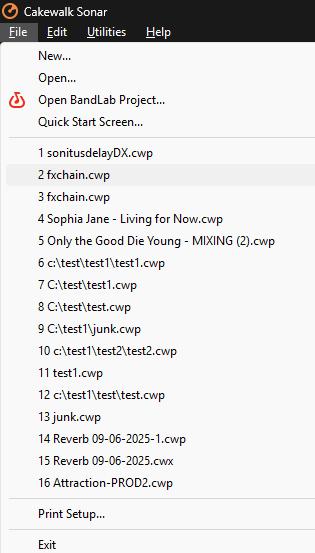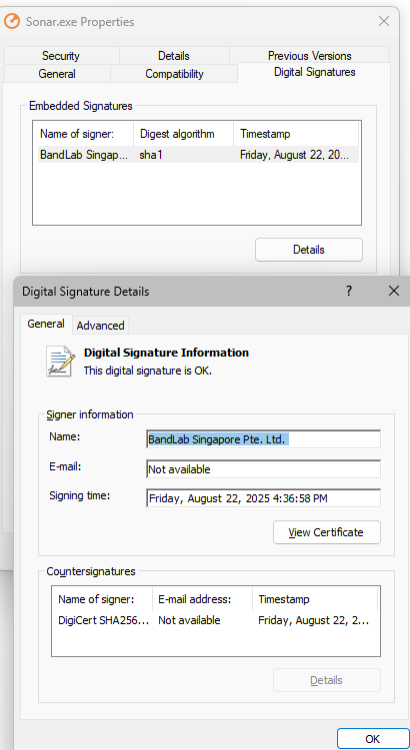-
Posts
5,849 -
Joined
-
Last visited
-
Days Won
107
Everything posted by Noel Borthwick
-

Weird dropout and other behaviors just started happening
Noel Borthwick replied to theanalog808's topic in Cakewalk Sonar
Interesting. Sonars optimizations that allow better low latency performance also implicitly means its using your CPU more efficiently, by keeping it busy. So its not impossible that it creates more heat on a loaded project. -

Weird dropout and other behaviors just started happening
Noel Borthwick replied to theanalog808's topic in Cakewalk Sonar
Have you looked into background processes? Your symptoms sound like some background progress either consuming excess CPU or interfering with your audio driver. If it's only in this project it could also be a plug-in. Sonar cannot excess cpu when it's not playing. -
This is most likely related to this issue which has been fixed for the next release. BTW the number keys change screensets, which are a different thing from workspaces.
-
@Jim Stamper this has been addressed for the next release.
-
@Max Arwood this was indeed a regression and it's been fixed for the next update.
-
I'll look when I get time but AFIK those names are not being explicitly managed by us but some middleware.
-
I believe it has something to do with how the framework manages duplicate names. The MRU from the standard file menu is directly managed by the UI framework. If you have saved multiple files with the same name but in different folders, I think it puts the full path there so that the user can find out which file it actually is. Like below. Otherwise, you'd have an MRU with 10 names that were identical so not very useful. It may not be ideal but its not something we're doing explicitly. I'll take a look and see its something we can control or improve.
-
Yeah Im sticking to that story 😛Auto correct never fails to amaze. And this is supposed to be Apple Intelligence no less. Did you see the problem when opening files from the standard file menu or using Quick Start. Next time it happens find out how you navigated to the file.
-
Hmm I don't believe I've encountered that. Are you by any chance typing in full paths for golf babes file names when opening them from the file dialog? do you typically open projects via quick start, file menu by navigation to the folder or by double clicking the file in Windows?
-

Any Experience with Any Users Co-Mixing on Sonar Remotely???
Noel Borthwick replied to minminmusic's topic in Cakewalk Sonar
If all you are doing is mixing try using splashtop. You will have to use wasapi shared to send the remote audio. Can't use ASIO. It works quite well to control a remote PC and listen to it's audio output. To use it on a local network is free but over the internet is a subscription. Fairly cheap though. -
@Max Arwood I can't reproduce the issue where it displays that error message here unfortunately. Edit: I can see the issue only if I OPEN your track template into the project then do a file save as and try and overwrite the SAME file. Please be explicit of the exact steps when reporting issues or include a video, since it's very hard for us to follow otherwise. If this is how you are doing it, why are you opening the track template from the file menu in the first place? Thats not the supported way to load track templates. Track templates are intended to be opened and saved from the track menu not the file menu.
-
If you are referring to lasso selection while playing its fixed for next release. There was a similar issue with slip editing that was fixed for this release, that was a side effect of some update optimizations we had done for the clips view. See the release notes. Improved responsiveness when slip editing clips in the clips view during playback.
-
I'll take a look and see what's throwing the error.
-

Cakewalk Sonar Paid Membership Buffer question
Noel Borthwick replied to Larry T.'s topic in Cakewalk Sonar
In ASIO mode buffer size is not stored by the host. It is global across all applications and managed by the ASIO driver. Sonar does not save or change the buffer size when the application starts up. It has never done so - in fact many ASIO drivers don’t even allow the host to change the buffer size. If its changing on you some other application is modifying it. -
I strongly suggest that you call Focusrite support and chat with them. Perhaps they have a different updated driver.
-

Cakewalk Sonar Paid Membership Buffer question
Noel Borthwick replied to Larry T.'s topic in Cakewalk Sonar
Your thread is confusing. There is no Sonar platinum or sonar premium. There is only a single Sonar now. What you get depends on your bandlab membership tier. Free vs membership. -

BBC Symphonic synth Freeze not sounding the same
Noel Borthwick replied to cabrol's topic in Cakewalk Sonar
If you load the exact same project in Cbb it is fine? One more thing to try is do a realtime bounce or freeze and see if there is a difference. If you send your project file you can also CC me. -

Cakewalk Core Plugins Feedback
Noel Borthwick replied to Noel Borthwick's topic in Instruments & Effects
@JBS thanks for your report. We'll investigate it. -

BBC Symphonic synth Freeze not sounding the same
Noel Borthwick replied to cabrol's topic in Cakewalk Sonar
@cabrol also instead of using the freeze button do the same test by selecting the synth tracks and doing a bounce to track. Does it sound the same in that case? This could be a plugin specific issue with bounce. -
It's not possible in this case for an invalid file to have come from us because if so, every single user would have seen the identical issue. Did you save a copy of the file before reinstalling? That would show if there was a difference. Even a single byte change in the file will void the digital signature, so disk corruption or something similar could cause such a problem as well. Looking at the file props as I showed in my screenshot would show that.
-
That specific error is telling us that the digital signature of the executable is invalid. The app will not activate without an exe properly signed by us. There are only 3 ways this can happen. 1. Your exe is corrupted on disk 2. Something external removed the digital signature 3. You obtained the exe from a source other than Cakewalk installers The fact that installing to product center solved the issue further confirms that you had an exe that was not legit. A proper exe should have a valid digital signature.






